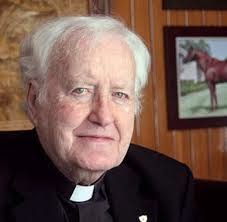Today, 11 October, is the Memorial of Pope St John XXIII, the date chosen because it is the anniversary of the opening of the Second Vatican Council in 1962. I remember watching that on black and white TV early in my second year in the seminary. That time we were around 180 seminarians in St Columban's, Dalgan Park, here in Ireland. Today we are around 60 priests, mostly retired, not a seminarian in sight. Only one seminary remains open in Ireland. So things have changed since 1962.
The Second Reading from the Office of Readings in the Breviary for the Memorial of Pope St John XXIII is an extract, below, from his address on the occasion of the opening of the Council. I have highlighted parts of it.
From the address of St John XXIII, Pope.
(At the solemn inauguration of the Second Vatican Ecumenical Council, 11 October 1962.)
The Church is the most loving mother of all
Today, Venerable Brethren, is a day of joy for Mother Church: through God's most kindly providence the longed-for day has dawned for the solemn opening of the Second Vatican Ecumenical Council, here at St Peter's shrine. And Mary, God's Virgin Mother, on this feast day of her noble motherhood, gives it her gracious protection.
Certain it is that the critical issues, the thorny problems that wait upon man's solution, have remained the same for almost twenty centuries. And why? Because the whole of history and of life hinges on the person of Jesus Christ. Either men anchor themselves on Him and His Church, and thus enjoy the blessings of light and joy, right order and peace; or they live their lives apart from Him; many positively oppose Him, and deliberately exclude themselves from the Church. The result can only be confusion in their lives, bitterness in their relations with one another, and the savage threat of war.
In these days, which mark the beginning of this Second Vatican Council, it is more obvious than ever before that the Lord's truth is indeed eternal. Human ideologies change. Successive generations give rise to varying errors, and these often vanish as quickly as they came, like mist before the sun.
The Church has always opposed these errors, and often condemned them with the utmost severity. Today, however, Christ's Bride prefers the balm of mercy to the arm of severity. She believes that, present needs are best served by explaining more fully the purport of her doctrines, rather than by publishing condemnations. Not that the need to repudiate and guard against erroneous teaching and dangerous ideologies is less today than formerly. But all such error is so manifestly contrary to rightness and goodness, and produces such fatal results, that our contemporaries show every inclination to condemn it of their own accord—especially that way of life which repudiates God and His law, and which places excessive confidence in technical progress and an exclusively material prosperity. It is more and more widely understood that personal dignity and true self-realization are of vital importance and worth every effort to achieve. More important still, experience has at long last taught men that physical violence, armed might, and political domination are no help at all in providing a happy solution to the serious problems which affect them.
The great desire, therefore, of the Catholic Church in raising aloft at this Council the torch of truth, is to show herself to the world as the loving mother of all mankind; gentle, patient, and full of tenderness and sympathy for her separated children. To the human race oppressed by so many difficulties, she says what Peter once said to the poor man who begged an alms: 'Silver and gold I have none; but what I have, that I give thee. In the name of Jesus Christ of Nazareth, arise and walk.' (Acts 3:6) In other words it is not corruptible wealth, nor the promise of earthly happiness, that the Church offers the world today, but the gifts of divine grace which, since they raise men up to the dignity of being sons of God, are powerful assistance and support for the living of a more fully human life. She unseals the fountains of her life-giving doctrine, so that men, illumined by the light of Christ, will understand their true nature and dignity and purpose. Everywhere, through her children, she extends the frontiers of Christian love, the most powerful means of eradicating the seeds of discord, the most effective means of promoting concord, peace with justice, and universal brotherhood.





